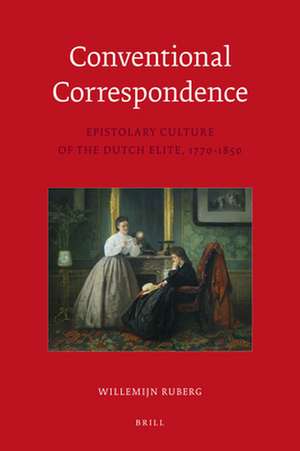Conventional Correspondence: Epistolary Culture of the Dutch Elite, 1770-1850: Egodocuments and History Series, cartea 4
Autor Willemijn Rubergen Limba Engleză Hardback – 8 sep 2011
Preț: 662.43 lei
Preț vechi: 807.85 lei
-18% Nou
Puncte Express: 994
Preț estimativ în valută:
126.80€ • 137.78$ • 106.58£
126.80€ • 137.78$ • 106.58£
Carte indisponibilă temporar
Doresc să fiu notificat când acest titlu va fi disponibil:
Se trimite...
Preluare comenzi: 021 569.72.76
Specificații
ISBN-13: 9789004209732
ISBN-10: 9004209735
Pagini: 281
Dimensiuni: 160 x 240 x 20 mm
Greutate: 0.61 kg
Editura: Brill
Colecția Brill
Seria Egodocuments and History Series
ISBN-10: 9004209735
Pagini: 281
Dimensiuni: 160 x 240 x 20 mm
Greutate: 0.61 kg
Editura: Brill
Colecția Brill
Seria Egodocuments and History Series
Cuprins
List of Figures
Introduction
1. Epistolary Theory
Introduction
Etiquette books and letter-writing manuals as a source Epistolary theory
Epistolary theory in practice
Famous letter-writers as a model
Conclusion
2. Everyday correspondence
Introduction
Writing materials and a place to write
Post
Languages
Salutation, signature and postscript
‘Le stile c’est l’homme’ – style
Themes and taboos
Receiving a letter
Conclusion
3. Children’s letters
Introduction
Learning to write letters
Confidentiality, naturalness and individuality Character building
Conclusion
4. Adolescents’ letters
Introduction
From schoolboy to student
Adolescents’ letters and gender
Engagement
Conclusion
5. Ceremonial correspondence
Introduction
Means of communication and customs
The content of ceremonial letters
The function of ceremonial correspondence
Cult of sincerity
Conclusion
Conclusion
Appendices
Bibliography
Index
Introduction
1. Epistolary Theory
Introduction
Etiquette books and letter-writing manuals as a source Epistolary theory
Epistolary theory in practice
Famous letter-writers as a model
Conclusion
2. Everyday correspondence
Introduction
Writing materials and a place to write
Post
Languages
Salutation, signature and postscript
‘Le stile c’est l’homme’ – style
Themes and taboos
Receiving a letter
Conclusion
3. Children’s letters
Introduction
Learning to write letters
Confidentiality, naturalness and individuality Character building
Conclusion
4. Adolescents’ letters
Introduction
From schoolboy to student
Adolescents’ letters and gender
Engagement
Conclusion
5. Ceremonial correspondence
Introduction
Means of communication and customs
The content of ceremonial letters
The function of ceremonial correspondence
Cult of sincerity
Conclusion
Conclusion
Appendices
Bibliography
Index
Notă biografică
Willemijn Ruberg is Assistant Professor in Cultural History at Utrecht University. Her research and teaching interests include the history of autobiographical writing, gender, emotion, sexuality and the body in the eighteenth and nineteenth centuries.











